Aaron Elson's Blog, page 16
November 27, 2013
December 22-28, 1941, Reverend Laine's diary
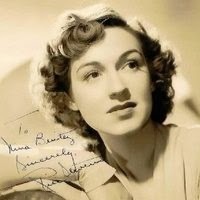 Rise Stevens
Rise StevensBefore there was Twitter, before there were bloggers, before there was the Internet even, there was the diary of the Rev. Edmund Randolph Laine of St. Paul's Episcopal Church in Stockbridge, Mass, a minister who was born to tweet. Heck, "Mrs. Cooper came about lighting of Christmas tree on lawn." "E. to Air Raid School." 7 - "Amos & Andy." Less than twenty words and you've got three Facebook status updates right there.
More than a decade ago I photocopied the minister's diary for the period from 1941 to 1945 after visiting the Stockbridge Library history room to see what Laine wrote the day Ed Forrest was killed. Laine raised Ed in the rectory of St. Paul's from the time he was 14. Ed and my father, 2nd Lt. Maurice Elson, knew each other in combat with the 712th Tank Battalion, and my father often spoke of Ed. My dad was wounded on Dec. 10, 1944 and didn't return to the battalion. Ed was killed on April 3, 1945.
After speaking at the Stockbridge Library this month about Ed Forrest and my book "The Armored Fist," I found there was great interest in Laine's diary among the audience, so I decided to revisit it, and now from time to time I'll be posting a week's worth of entries. Forgive the question marks where I was unable to decipher his handwriting, and the occasional misspelling of a name or outright mistake.
If you'd like to start at the beginning -- I began posting diary entries from December 1, 1941 -- you can see them here.
Dec. 1-7, 1941
Dec. 8-15, 1941
Dec. 15-22, 1941
 December 22, 1941Dec. 22: (Monday) (Shortest day of Year) (Pres. signed new draft bill to-day) Very cold, sunny. Up 10:50. 11 - News. Ans. some responses. Read "Times." 2 - Mrs. Merwin & Mrs. Cooper came about lighting of Christmas tree on lawn. Letter from Mrs. Clapper about Carlyn. Read "Eagle" & in "Times." Wrote some answers. Box of fruit received from Mr. & Mrs. Parsons from Florida. 6 - News. Eve. ─ 6:45 - News from Washington, Manila, London. 7 -"Amos & Andy." E to Air Raid School. Miss F. & I wrapped up some Christmas presents. Read in "The Hero in America." 9 - Quincy Howe. 10- Raymond Gram Swing. Had ham sandwiches. 11 - News. 11:15 - to P.O.
December 22, 1941Dec. 22: (Monday) (Shortest day of Year) (Pres. signed new draft bill to-day) Very cold, sunny. Up 10:50. 11 - News. Ans. some responses. Read "Times." 2 - Mrs. Merwin & Mrs. Cooper came about lighting of Christmas tree on lawn. Letter from Mrs. Clapper about Carlyn. Read "Eagle" & in "Times." Wrote some answers. Box of fruit received from Mr. & Mrs. Parsons from Florida. 6 - News. Eve. ─ 6:45 - News from Washington, Manila, London. 7 -"Amos & Andy." E to Air Raid School. Miss F. & I wrapped up some Christmas presents. Read in "The Hero in America." 9 - Quincy Howe. 10- Raymond Gram Swing. Had ham sandwiches. 11 - News. 11:15 - to P.O.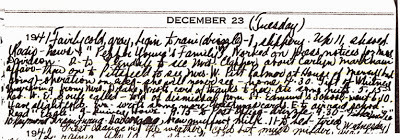 December 23, 1941
December 23, 1941Dec. 23:(Tuesday) Fairly cold, gray, began to rain (drizzle) 1, slippery. Up 11, shaved. (Radio - News & "Pepper Young's Family." Worked on press notices for Mrs. Davidson. 2 - to Glendale to see Mrs. Clapper about Carlyn Markham affair - then on to Pittsfield to see Mrs. W. Pitt Palmer at House of Mercy (bad going) - operation on eyes - she will never see - home 4:30. Gift of Whitney engraving from Mrs. Drake. Wrote card of thanks to her. Ate some nuts. 5:15 - Rev. W.E. Soule called - told of dismissal from St. Edmund's School - went 6:10. Have slight cold. Eve. - wrote some more Christmas cards. E. to air raid school. Read "Eagle." 9 - Quincy Howe. 9:15 to Post Office - drizzle. 9:30 - "Fibber McGee." 10 - Raymond Gram Swing. Had orange, bran muffin & milk. 11 - to bed - tired.
 December 24, 1941
December 24, 1941Dec. 24: (Wednesday - Christmas Eve) Very warm, rained hard a.m., then cleared, some sun. Restless night - have heavy cold. Up 11:10, shaved, syhower bath. Fixed turkeys & chickens & wine jelly for distribution. 2 - C.M. delivered. Then Rev. W.E. Soule called. Put out Christmas tree on Dining Room table & Christmas picture on hall table & wreath on door. 3:45 - read "Times." 4 - News. 5 - Speeches at the lighting of White House Christmas tree - Pres. Roosevelt & Winston Churchill. Picked out psalm & lessons for evening. Wrote note of thanks to Mrs. Merwin. 6 - News. Eve. - wrote note to Mr. Norman H. Davis. 8 - Evening prayer (good cong.) & Carols - over 9:05. Malcolm French & his wife in 9. 11 - to bed - feeling very sick with cold.
 December 25, 1941
December 25, 1941Dec. 25:(Thursday - Christmas Day) Mild, gray. Had restless night, nose bled. Up 6:45, shaved. 8 - Holy Com. (17) - C.M. served. Had presents in Dining Room afterward. C.M. took me to S. Lee - 9:15 - spoke at (?) - back 10:20. 11 - Stockbridge - good cong. - no sermon. Alexander Sedgwick (?) - over 1:20. (?) Dinner - 1:15 - turkey, duck, champagne. Quite gray. Sent some jelly to Mrs. Sperry. 3:45 - E. took Miss F. home. 4 - ride with E. to Lebanon - home 5. Ate orange. Read "Times." Wrote ans. to Rev. R.H. Hayden about Amicus Retreat. 6 - News. E. came & read in Study. Dozed in chair in Study. Radio music. Wrote letter to Miss Robinson Smith. 7:30 - Arthur Hale. E. went to air raid center. Finished "The Hero in America." 9 - Quincy Howe. 10 - Raymond Gram Swing. Had ice cream & apple. 11 - News.
 December 26, 1941
December 26, 1941Dec. 26: (Friday) Cool, gray. Up 11:45, shaved. Noon - News. 12:30 - speech of Hon. Winston Churchill bef. Senate & House of Representatives - over 1:04. 3 - to Derricks & Bramans - bot presents for acolytes & others. Lucy Beacco called soliciting for soldiers. To Library & then to see Mrs. Guerrieri - back from Hospital. Read "Eagle." Read in "Times." 6 - News. Eve - E. to Air Raid School. D. Braman in 7:45 - talked with him until 11. E. back 10. 11 - News. 12 - News.
 December 27, 1941
December 27, 1941Dec. 27:(Saturday) Mild, gray, drizzle at times. Up 10:30. Read "Times" & in Hindus' "Hitler Cannot Conquer Russia." 2 - "Lakme" from Met. Opera. E. helping C.M. trimming Christmas Tree in Parish House. 3:15 - 2nd sunrise prayer meeting at door. 6 - News. Had turkey back for dinner. E. took his radio to Lee & had it fixed. Read in "Wild is the River" - finished it. Worked on sermon. E. to Occ. Club. Shower bath. 10:30 - to bed.
 December 28, 1941
December 28, 1941Dec. 28: (Holy Innocents, Christmas I) Cold, gray, sun out 11:30. Up 7:35, shaved. 9:15 - S. Lee - "The Christ Child" - back 10. Grace Tennison. 11 - Stockbridge - "Lessons for to-day from Bethlehem" - 8(?) Matt. 18, V.1, (?)3. (22 min.) Holy Com. Had cold turkey for lunch. Read in "Times." 3:15 - ride to Chatham - back 4:20. Put some presents under Christmas tree in Parish House. Read in "Times." 5 - Met. Opera auditions. Joanna Franz phoned. E. read in study. 5:45 - Wm. L. Shirer. 6:30 - changed clothes. 6:50 - to church. 7 - Church School Service - then 7:18 - to Parish House - Christmas Party - over 8:10. 9 - Ford Hour - Rise Stevens. Letter from Bp. Lawrence. Snowing. 11 - News. 11:15 - Caesar Searchinger.
Rise Stevens
Published on November 27, 2013 20:35
November 23, 2013
Handlebar Hank
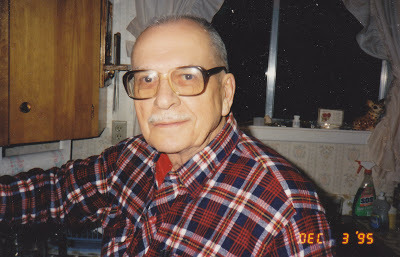 Dale Albee in 1995 Coming soon: "From the Cavalry to Czechoslovakia: A 712th Tank Battalion Interview with Dale Albee" I visited Dale in Prospect, Oregon, in December of 1995. He was a platoon leader in the 712th, with which my father served. Dale was a sergeant in the third platoon of Company D, the battalion's "light" tank company. He eventually received one of the 14 battlefield commissions. The audio of Dale's interview is in my original audiobook, Handlebar HankFrom "From the Cavalry to Czechoslovakia" (c) 2013 Aaron Elson
Dale Albee in 1995 Coming soon: "From the Cavalry to Czechoslovakia: A 712th Tank Battalion Interview with Dale Albee" I visited Dale in Prospect, Oregon, in December of 1995. He was a platoon leader in the 712th, with which my father served. Dale was a sergeant in the third platoon of Company D, the battalion's "light" tank company. He eventually received one of the 14 battlefield commissions. The audio of Dale's interview is in my original audiobook, Handlebar HankFrom "From the Cavalry to Czechoslovakia" (c) 2013 Aaron Elson Aaron Elson: Now, what exactly happened in Binscheid?
Dale Albee: All right. It was in February, after the Bulge. We had been sent out, and I was working with Mike. I may be wrong, but I think the 4th Armored was going down the main road, and we were going off to the side to clear villages like we normally do, keep everything clear on the flank. And we came up to this little hill and stopped. Old Mike motioned to me to come forward, so I dismounted and went up, and we looked out. Binscheid was over here, the town. The road came down around this way and came into the town. And in this field out here there’s a creek, right here down below this little bluff. In this field out here is Germans all over the place, with their holes dug and everything just walking around. They didn’t even know we were there.So we figured, well shoot, this is like most of the other towns, they’ve got them out to protect the town. We called back for infantry, and waited for about an hour and a half, and they sent the infantry up. They sent 15 green infantry. Handlebar Hank, I’ll never know his name and I wish I knew it because bless his soul, but old Handlebar Hank, the sergeant, was the only oldtimer. He had a big handlebar mustache and his name was Hank, that’s the reason we just called him Handlebar Hank. So Mike said, “If I send jeeps, anything can knock them out. How about if you lead out and go down the road, I’ll fire for support here and then I’ll get the support down to you right away, and then we’ll fan out and go on into the town.”Okay, fine. So we got all set, and I took off in my tanks and went over the hill and we opened up on these guys here and we gave the infantry time to get around and get in position so they could sweep around this way and then protect me as I came over the hill.We sailed over the hill and went around, and opened fire. I went down this little dip and just went up, and oh, just topped the rise, and I was planning on stopping just beyond that rise and opening up. Well, right there is where I set off the mine. And it knocked our tank out. So we dismounted and got behind the tank. There’s a damn machine gun right straight ahead of us firing on us but we all got behind the tank, and I hollered, “Send up my second tank!” The second tank came up right in my tracks. And they got up maybe twice as far as from here to that bush from me, and they rolled across and all of a sudden there’s the damnedest explosion.Later on we learned that what it was was the Italian box mine, and what it does, it’s a big box that goes across the road, and then it’s got two cutters. And when you roll across that it cuts a wire and sets off the thing.Evidently, the light tank wasn’t heavy enough to cut it completely, so when they rolled over they cut it. When that exploded, it blew the whole bottom of the tank in, and of course stopped the tank right away. So I ran over, and the hatch was blown loose, threw it up. Slick was the driver, I knew he was dead because he was just kind of slumped forward, and the whole back end of his head was gone. And his back was just shredded. And the little assistant driver, he couldn’t stand up. So I grabbed him under the arms and pulled him up, and just threw him over, and then ran up.Murphy was crawling out of the turret by that time, and I just helped him out, and Holt was trying to get out. And then like a goddamn fool...
Aaron Elson: That was Holt in that tank, too?
Dale Albee: I think it was. I have to check, but it just seems to me that poor old Holt, that was the third time he was wounded. But I know Murphy was in there.
Aaron Elson: Now how did you go into the tank?
Dale Albee: I didn’t go in. I just ran up on the front slope plate, and stood right there, like this is a hatch right here, and this is the driver, I knew he was dead, so I just stepped over here and here’s the bow gunner. I grabbed him, and where you get the strength I don’t know, but I pulled him up, and his legs were broken I don’t know how many times below the knees, and that’s the reason he couldn’t stand up to get out. And then I just ran up here, and right here is Murphy, and helped him over, and then I saw Holt was getting out, and I’m pretty sure it was Holt. And then instead of jumping behind that tank, I turned around and ran back to my own tank, behind it.Handlebar Hank was laying in the road. That explosion of the second tank knocked the living daylights out of him and he just kind of jumped up and then fell, and this damn machine gun opened up, and you saw the tracers come by here like that that missed him. And then the second time he came back it walked right up over his shoulder.I ran back, got Handlebar Hank, pulled him over and got him into the ditch between me and my tank. And then we called for artillery support because I knew we couldn’t do a damn thing, and there’s two Germans right in here, we knew they were there, so, you know, the old “Kommen Sie Hier Macht Schnell Mit der Hande Ho Oder Ich Schiessen.” We captured those two Germans. They came running over. So we called for artillery.In the meantime, the Germans started throwing artillery in on us. So I called back and said, “Send us help,” for support, to get the wounded out. And the fences there were these little, kind of like a pole fence, so what we did we’d reach up and grab those poles, put two down like that and we took our coats off and our tanker's jackets and run the sleeves through it, we made stretchers. And I had to call back and had Pat [Shortall] just start backing up, and I think Holmes was the one behind him. I had them back up and open fire to pin anything down here and then we got everybody out of there that was wounded. We made the two PWs help us carry them. And the last time I saw Handlebar Hank, we radioed back and they sent a medic jeep up, and old Handlebar Hank was laying on a litter on this medic jeep, he had a cigarette, his hands all bloody and blood all over, puffing, and he looked over at me and I said, “How are you, Handlebar?”He said, “I got me a million dollar wound. I’m going back to the States.”
- - -
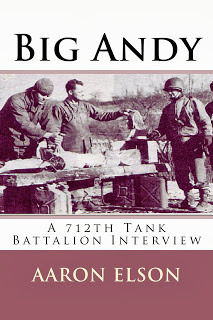 Paperback Kindle
Paperback Kindle
Published on November 23, 2013 18:33
November 20, 2013
More from the 1941-45 diary of an Episcopalian minister
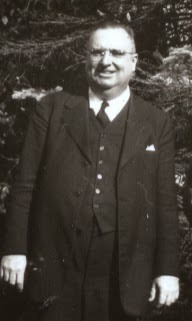 The Rev. Edmund Randolph Laine, year unknown
The Rev. Edmund Randolph Laine, year unknownIf I were to post a week's worth of entries each week from the 1941-45 diary of the Rev. Edmund Randolph Laine, that would take the better part of the next four years, so I'm going to space the entries out and probably take the better part of the next ten years, but I don't want to crowd out my other World War II stories.
These transcriptions are daunting, so I hope you'll pardon the question marks where I was unable to make out Laine's handwriting. But they are also fun, considering the references and links available on the Internet. It's as if there were a history lesson on every page. Perhaps not, but in this post you'll find a link to a 2012 New York Magazine article quoting a 1941 book Laine was reading, and a link to the 2011 funeral of a prominent citizen.
 December 15, 1941
December 15, 1941Dec. 15: (Monday) Cold, snowing. Up 10:50, shower bath. Mrs. Kimberly phoned 10:40. Church Year Book in morning mail. Looked over it. 1 - to Pittsfield with C.M. [Carlyn Markham?] - haircut - back 3. Read "Times" & "Eagle." H(?) French in. 5 - special Trustees meeting at library - over 5:25. Saw D. Braman & E. on street - E. [Ed Forrest] bot [bought] a Christmas present in Braman's. Phoned Mrs. Davidson. 6 - News. Eve - wrote 7 letters & 1 acknowledgment. Mrs. Nettleton phoned. Mr. Stevens of Gr. Barr. phoned asking me to speak at Gr. Barr. Rotary (but I declined). Phoned Fr. Jones. 9 - Quincy Howe. To Post Office. Read in Hayes' "Generation of Materialism" 9:45 - Raymond Gram Swing. Had apple, junket & tangerine. 11 - News. Read in Hayes' book.
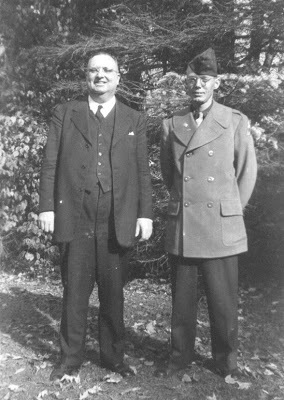 Reverend Laine and Ed Forrest
Reverend Laine and Ed Forrest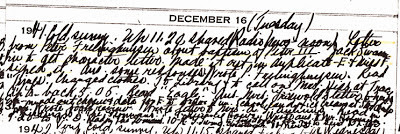 December 16, 1941 Dec. 16: (Tuesday) Cold, sunny. Up 11:20, shaved. Radio News - noon - Letter from Peter Frelinghuysen about baptism of Peter III. Jack Swann(?) in to get character letter. Made it out in duplicate - E. [Ed Forrest] and Miss F. [Jessica "Aunt Jess" French] typed it. Ans. some responses. Wrote P. Frelinghuysen. Read "Times." Changed clothes. To Library and to call on Mrs. Hiss at Tracy (?) 4 - back 5:05. Read "Eagle." Ans. Mrs. Griswold's letter. 6 - News. Eve - made out cheque and date for E. to order Sun. School candy and ice cream at (?). Wrote book review. Wrote letter to Mrs. A.G. Andrews(?) 9 - Quincy Howe. Wrote ans. to Mr. Hofmayer. 9:20 - to P.O. Read in "The Germans." E. found book for me to send Bp. Soc.(?) 10 - R.G. Swing. (?) 11 - News.
December 16, 1941 Dec. 16: (Tuesday) Cold, sunny. Up 11:20, shaved. Radio News - noon - Letter from Peter Frelinghuysen about baptism of Peter III. Jack Swann(?) in to get character letter. Made it out in duplicate - E. [Ed Forrest] and Miss F. [Jessica "Aunt Jess" French] typed it. Ans. some responses. Wrote P. Frelinghuysen. Read "Times." Changed clothes. To Library and to call on Mrs. Hiss at Tracy (?) 4 - back 5:05. Read "Eagle." Ans. Mrs. Griswold's letter. 6 - News. Eve - made out cheque and date for E. to order Sun. School candy and ice cream at (?). Wrote book review. Wrote letter to Mrs. A.G. Andrews(?) 9 - Quincy Howe. Wrote ans. to Mr. Hofmayer. 9:20 - to P.O. Read in "The Germans." E. found book for me to send Bp. Soc.(?) 10 - R.G. Swing. (?) 11 - News. December 17, 1941Dec. 17: (Wednesday) Fairly cold, sunny. Up 11, shaved (Radio - noon - News). 2:15 - Mrs. Peter Frelinghuysen phoned from N.Y. asking me to come down & baptize Peter III to-morrow. Ans. some appeal responses. Read "Times." To Library - walked to Golf Grounds and back. E. got me timetable at Station. 5:35 - phoned Fr. Jones at St. Edmund's School. 6 - News. Eve - men began to trim church for Christmas. Wrote letter (Mrs. Rockwood) and made out baptismal certificate and wrote up press notices. 8:20 - to Post Office and in to church. Read in Muhlbach's "Goethe and Schiller." 9:35 - packed bag. 10 - Raymond Gram Swing. 10:35 - shower bath and to bed.
December 17, 1941Dec. 17: (Wednesday) Fairly cold, sunny. Up 11, shaved (Radio - noon - News). 2:15 - Mrs. Peter Frelinghuysen phoned from N.Y. asking me to come down & baptize Peter III to-morrow. Ans. some appeal responses. Read "Times." To Library - walked to Golf Grounds and back. E. got me timetable at Station. 5:35 - phoned Fr. Jones at St. Edmund's School. 6 - News. Eve - men began to trim church for Christmas. Wrote letter (Mrs. Rockwood) and made out baptismal certificate and wrote up press notices. 8:20 - to Post Office and in to church. Read in Muhlbach's "Goethe and Schiller." 9:35 - packed bag. 10 - Raymond Gram Swing. 10:35 - shower bath and to bed.
 December 18, 1941Dec. 18: (Thursday) Stockbridge and New York City. Fairly cold, sunny. Up 6:20, shaved. 7:20 - breakfast. Read "Times." 8:20 - left in car with C.M. for Hillsdale - arr. 9:15 train 1/2 hr. late. Reached N.Y. - 12:30 - taxi to Mrs. Frelinghuysen's ap't. 4 - 714 Park Ave. - Baptism of Peter Frelinghuysen III - then to lunch at the Rodney Procter's. Visit with the Procters. Left 4:07 from Grand Central - arr. Hillsdale 7:07. Had to wait till 7:30 for E. My own mistake - home 8:10. Had duck for dinner. (C.M. took Miss F. and sister to Pittsfield this a.m.) Went over mail. 10 - R.G. Swing. Wrote 5 letters. Tired.
December 18, 1941Dec. 18: (Thursday) Stockbridge and New York City. Fairly cold, sunny. Up 6:20, shaved. 7:20 - breakfast. Read "Times." 8:20 - left in car with C.M. for Hillsdale - arr. 9:15 train 1/2 hr. late. Reached N.Y. - 12:30 - taxi to Mrs. Frelinghuysen's ap't. 4 - 714 Park Ave. - Baptism of Peter Frelinghuysen III - then to lunch at the Rodney Procter's. Visit with the Procters. Left 4:07 from Grand Central - arr. Hillsdale 7:07. Had to wait till 7:30 for E. My own mistake - home 8:10. Had duck for dinner. (C.M. took Miss F. and sister to Pittsfield this a.m.) Went over mail. 10 - R.G. Swing. Wrote 5 letters. Tired. December 19, 1941Dec. 19: (Friday) Fairly cold, sunny. Miss F. woke me at 9:40. Shaved and dressed quickly. Breakfast 10:20. 11 - Meeting of Laurel Hill [Association] in Library (Jack White, Chief Air Warden, spoke) - home 12:15. Read "Times." 1:30 - to Lenox (Bank) - back 2. Had sandwiches. Mrs. Hiss phoned. 3:35 - "Guiding Light." 3:45 - "Vic and Sade." Wound clocks. Read "Eagle." Read of Germany retreat in Russia in "Times." 6 - News. Eve - to Parish House to get Sun. Sch. Record Book. 7:15 - News from Ankara, Turkey, Manila, Honolulu, London, Washington. Made up money for Sunday School, etc. Christmas presents. 9 - Quincy Howe. Read in "The Hero in America."
December 19, 1941Dec. 19: (Friday) Fairly cold, sunny. Miss F. woke me at 9:40. Shaved and dressed quickly. Breakfast 10:20. 11 - Meeting of Laurel Hill [Association] in Library (Jack White, Chief Air Warden, spoke) - home 12:15. Read "Times." 1:30 - to Lenox (Bank) - back 2. Had sandwiches. Mrs. Hiss phoned. 3:35 - "Guiding Light." 3:45 - "Vic and Sade." Wound clocks. Read "Eagle." Read of Germany retreat in Russia in "Times." 6 - News. Eve - to Parish House to get Sun. Sch. Record Book. 7:15 - News from Ankara, Turkey, Manila, Honolulu, London, Washington. Made up money for Sunday School, etc. Christmas presents. 9 - Quincy Howe. Read in "The Hero in America." December 20, 1941Dec. 20:(Saturday) Cold, sunny. Up 10:35. Ans. some appeal responses. Worked preparing Christmas cards to for mail. 2 - "Marriage of Figaro" from Met. Opera. E. to Pittsfield. Read "Eagle" and "? Church". Mrs. Geo. Fellows called. Read "Times." 6 - News. 6:15 - Eleanor Dusenbury in - gave her Christmas money for choir. 7:30 - Arthur Hale. E. to Air Raid duty at Am. Legion. (?)( 7:45 - H.V. Kaltenborn. Read in Wecter's "The Hero in America." Worked on sermon. Grown very cold. Shower bath. 11 - News.
December 20, 1941Dec. 20:(Saturday) Cold, sunny. Up 10:35. Ans. some appeal responses. Worked preparing Christmas cards to for mail. 2 - "Marriage of Figaro" from Met. Opera. E. to Pittsfield. Read "Eagle" and "? Church". Mrs. Geo. Fellows called. Read "Times." 6 - News. 6:15 - Eleanor Dusenbury in - gave her Christmas money for choir. 7:30 - Arthur Hale. E. to Air Raid duty at Am. Legion. (?)( 7:45 - H.V. Kaltenborn. Read in Wecter's "The Hero in America." Worked on sermon. Grown very cold. Shower bath. 11 - News. December 21, 1941Dec. 21: (Advent 4) Very cold (zero), sunny. Up 7, shaved. 8 - Holy Com. (8) 9:15 - South Lee - choir again for 1st time - read Bp. Lawrence's Pastoral Letter - back 10:05. Into Sunday School - gave teachers money for Christmas presents. 11 - Stockbridge - "Haggai and the UnbuiltTemple" (20 min.). Had talk with Carlyn Markham - he gave up care of clock. Read in "Times." 2:30 - rode with E. to Monterey - home 3:35. Bitterly cold. Read in Korn's (?) "History" on Austrian Seven Weeks War (1866). Letter from C. de Gersdorff. 5 - Met. Opera Auditions. Read in "Times." 5:45 - Wm. L. Shirer. 6 - News (Hitler takes command of German armies). 7(?) - News. Eve - E. to lecture in Pittsfield. Miss F. home. Wrote 3 letters & some cards. 8:40 - to P.O. 9 - Ford Hour (Christmas music). 11 - News.
December 21, 1941Dec. 21: (Advent 4) Very cold (zero), sunny. Up 7, shaved. 8 - Holy Com. (8) 9:15 - South Lee - choir again for 1st time - read Bp. Lawrence's Pastoral Letter - back 10:05. Into Sunday School - gave teachers money for Christmas presents. 11 - Stockbridge - "Haggai and the UnbuiltTemple" (20 min.). Had talk with Carlyn Markham - he gave up care of clock. Read in "Times." 2:30 - rode with E. to Monterey - home 3:35. Bitterly cold. Read in Korn's (?) "History" on Austrian Seven Weeks War (1866). Letter from C. de Gersdorff. 5 - Met. Opera Auditions. Read in "Times." 5:45 - Wm. L. Shirer. 6 - News (Hitler takes command of German armies). 7(?) - News. Eve - E. to lecture in Pittsfield. Miss F. home. Wrote 3 letters & some cards. 8:40 - to P.O. 9 - Ford Hour (Christmas music). 11 - News.The Austrian Seven Weeks War
More Journal entries:
Dec. 8-15, 1941
Dec. 1-7, 1941
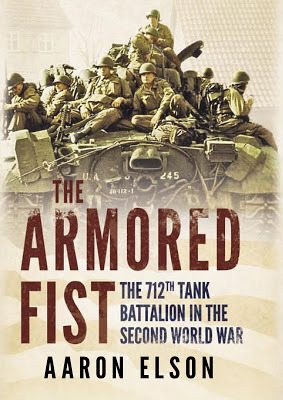 Give some punch for the holidays!
Give some punch for the holidays!
Published on November 20, 2013 10:15
November 15, 2013
December 8-14, 1941
 Diary of Rev. Edmund Randolph Laine, Dec. 8, 1941 Before I proceed with the journal of the Rev. Edmund Randolph Laine of St. Paul's Episcopal Church in Stockbridge, Mass., from 1941-45, it's important to note that Dorothy Cooney once told me the often crammed and clipped and abbreviated language of the journal doesn't do justice to Rev. Laine's eloquence. So I'll interject one passage here that was not in the journal, but rather was inscribed in a book that Laine gave to Ed Forrest's friend Dave Braman after Ed was killed in World War II. (Laine raised Ed from the time he was 14. Ed, whom my father knew in combat, was killed at Heimboldshausen, Germany, on April 3, 1945.)
Diary of Rev. Edmund Randolph Laine, Dec. 8, 1941 Before I proceed with the journal of the Rev. Edmund Randolph Laine of St. Paul's Episcopal Church in Stockbridge, Mass., from 1941-45, it's important to note that Dorothy Cooney once told me the often crammed and clipped and abbreviated language of the journal doesn't do justice to Rev. Laine's eloquence. So I'll interject one passage here that was not in the journal, but rather was inscribed in a book that Laine gave to Ed Forrest's friend Dave Braman after Ed was killed in World War II. (Laine raised Ed from the time he was 14. Ed, whom my father knew in combat, was killed at Heimboldshausen, Germany, on April 3, 1945.)The book is a small, hardcover edition of the story "England to America" by Margaret Prescott Montague. The story was first published in the Atlantic Monthly and was the winner of the very first Ohenry Prize for short story writing in 1919.
- - -
To David E. Braman,
Dear Dave,
This classic little story of the First War of 1917-1918, was a great favorite with Eddie. I gave it to him in 1929, and he read it many times. You and I can appreciate the truth, the grace and the poignancy of this narrative, since like Chev Sherwood, Eddie passed over, fighting gallantly for his country. Little did he think as he read it, that the years to come would call him to the same manly sacrifice. You were his beloved friend, keep this cherished book of his, in proud remembrance. From, Edmund Randolph Laine, June 21 - 1946. Stockbridge, Massachusetts.
- - -
As you may have noticed, the minister's handwriting, especially toward the end of crowded entries, is a little difficult to read. Even in less crowded areas, the top of a 'd,' for instance, will jut up into the line above it, causing all manner of confusion. I'm not familiar with the names of many of the people he references, and so you'll see a lot of question marks where I was unable to make out what he was writing. Nevertheless, much of the important material in the journal -- who and what he was listening to on the radio, what newspapers, books and magazines he was reading -- are fairly legible. I will do my best from here on out to annotate, hyperlink and explain what some of those references are.
 December 8, 1941
December 8, 1941Dec. 8: (Monday) (cross symbol) (war declared, circled) Cold, sunny. Up 11, shaved (Radio - News, "Pepper Young's Family") 12:30 - while eating heard Pres. Roosevelt address Congress - War message - calling for declaration of war on Japan - over 12:45. Then broadcast of speeches in House of Representatives. 1:00 - News that Senate had voted dec. of war. Roll call in House of Rep. began 1:04. 1:14 - majority vote reached in House of Rep. 1:16 - news. Read "Times." 3 - Winston Churchill speaking at Parliament in London - over 3:22. Around grounds & walked down Main St. Mrs. Dixson(?) spoke to me. Talk with C.M. [Carlton Markham?] & gave him book. Read "Eagle." Began to read (?) . 6 - News. 10 - Pres. signed Dec. of War. 9 - Quincy Howe. E. read in study. 10 - R.G. Swing. Read in (?). 11 - News.
 December 9, 1941Dec. 9: (Tuesday) Fairly cold, gray, snowing some. Up 11, shaved, shower bath. Noon - News (Planes Raid to be near N.Y.)[this may be air raid duty] Mrs. W. Pitt Palmer phoned (going to hospital for operation on eyes to-morrow). 2:15 - left in car with C.M. for Springfield. Snowing but not too cold - arr. Diocesan House 3:40. 4 - Meeting of Adult Education Com. - talk with Fr. Butler about Farrell case afterward. Started home 6 - bad going on ladder - arrived 7:40. 8 - dinner. Read "Eagle." Read "Christian Century" & "Times." 9 - Quincy Howe. 9:30 - "Fibber McGee." 10 - Pres. Roosevelt addressing the people on the War (E. listened to it) over 10:25. Had bran muffin & apricots. 11 - News. Read in "Goethe & Schiller."
December 9, 1941Dec. 9: (Tuesday) Fairly cold, gray, snowing some. Up 11, shaved, shower bath. Noon - News (Planes Raid to be near N.Y.)[this may be air raid duty] Mrs. W. Pitt Palmer phoned (going to hospital for operation on eyes to-morrow). 2:15 - left in car with C.M. for Springfield. Snowing but not too cold - arr. Diocesan House 3:40. 4 - Meeting of Adult Education Com. - talk with Fr. Butler about Farrell case afterward. Started home 6 - bad going on ladder - arrived 7:40. 8 - dinner. Read "Eagle." Read "Christian Century" & "Times." 9 - Quincy Howe. 9:30 - "Fibber McGee." 10 - Pres. Roosevelt addressing the people on the War (E. listened to it) over 10:25. Had bran muffin & apricots. 11 - News. Read in "Goethe & Schiller."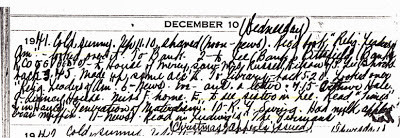 December 10, 1941
December 10, 1941Dec. 10:(Wednesday) Cold, sunny. Up 11:10. Shaved (Noon - News). Rec'd book "Relig. Leaders of Am." - looked over it. To Bank. 2 - to Lee (Bank), to Pittsfield (Bank & ?) - to House of Mercy, saw Mrs. Russell Wilson of S. Lee (?) back 3:45. Made up some acc'ts. To Library - back 5:20. Looked over "Relig. Leaders of Am." 6 - News. Eve. - ans. a letter. 7:15 - Arthur Hale. 9 - Quincy Howe. Miss F. home. E. to see sister in Lee. Read "Times." & in Hayes' "Generation of Materialism." 10 - R.G. Swing. Had milk, apple & bran muffin. 11 - News. Read in Ludwig's "The Germans." (Christmas Appeals issued)
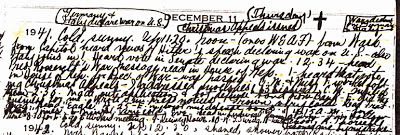 December 11, 1941
December 11, 1941Dec. 11: (Germany & Italy declare war on U.S.) (Christmas Appeals issued) (War declared on Germany & Italy) Cold, sunny. Up 11:20. Noon - (over WEAF) from Wash. from Capitol heard news of Hitler's speech declaring war on U.S. - also Italy joins in! Heard vote in Senate declaring a war. 12:34 - heard Pres. Roosevelt's War message read in House of Reps. for Dec. of War - was passed. C.M. & Miss F. worked folding Christmas Appeals. I addressed envelopes (63 issued). C.M. mailed them - 2:30. Made out application & bot [bought] defense bond from Bank - E. did the business(?) for me. Wrote Sun. press notices. Grown very cold. Read Frat. mag. Read "Eagle." 4:25 - E. in, brot my defense bond. Read "Times" & news(?). Very cold. Eve. - read in Ludwig's "German." 8:30 p.m. E. to go to Award meeting. 9 - Quincy Howe. 10 - R.G. Swing. 11 - News. 4:15 a.m. - fire[false?] alarm. R.(?) phoned me by mistake.
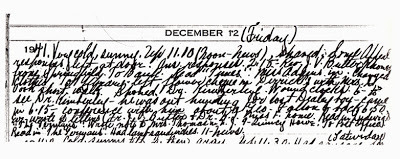 December 12, 1941
December 12, 1941Dec. 12: (Friday) Very cold, sunny. Up 11:20 (Noon - News), shaved. Some Appeal responses left at door. Ans. responses. 2:15 - Rev. J.V. Butler phoned from Springfield. To Bank. Read "Times." Miss Adams in. Changed clothes. To Library - left flower cheque in Derrick's with Mrs. (?). Took short walk. Phoned Dr. Kimberly. Wound clocks. 6 - to see Dr. Kimberly - he was out hunting for lost Dealey boy - came in 6:15. Conference with him about Geo.(?) Fallon - back 6:50. Eve. - wrote 2 letters (Fr. (?) Butler(?) & Dr. (?). Miss F. home. Read in Ludwig's "The Germans." Wrote note to Mrs. Thomas in N.J. 9 - Quincy Howe. To post office. Read in "The Germans." Had lamb sandwiches. 11 - News.
 December 13, 1941
December 13, 1941Dec. 13:(Saturday) Cold, snowing. Up 12:05, shaved. Radio - News. Read "Times." Joanna Franz phoned about evening party. Phoned Mrs. Sedgwick. 3:15 - to Jr. Choir Party in Parish House - home - 4:50. Read "Eagle." Ans. some Appeal responses. Picked out hymns. E. to Pittsfield - p.m. 6 - News. E. to Air Raid duty & then to Occ. Club. Read in Ludwig's "The Germans." Raining hard. 8:25 - into Young People's party in Par. House - talked with Mrs. Franz. Read on "Esther." Worked on sermon. Ate apple. 11 - News. Shower bath.
 December 14, 1941
December 14, 1941Dec. 14: (Advent 3) Fairly cold, rained till 10 a.m. bad under foot. Up 7:35, shaved. Breakfast 8:35. 9:15 - S. Lee - Holy Com. - back 10:05. T. Burt* opened Sun. School. Spoke to children. 11 - Stockbridge - "Esther." (19 min.) Spoke of war. Cleared - a little subn. Read in "Times." 3 p.m. - N.Y. Symph. Orch. 4:30 - E. came & read "Times" in study. 4:30: Albert Spalding. 5 - Met. Opera Auditions. 5:45 - Wm. L. Shirer. Eve. - Miss F. to the Pillings - ans. some Appeal responses. E. read in Ludwig's "The Germans" in the study. 9 - Ford Hour (Richard Crooks). Read some stories in out Vol. Dumas. 10 - News
*T. Burt almost certainly was Tommy Burt, I'm guessing 16 or 17 years old at the time. The week that Ed Forrest was killed, but still before the telegraph arrived, Reverend Laine learned that Tommy Burt was killed "on the Western front," and paid a call on his grieving parents. Tommy's brother Jimmy Burt would be awarded the Medal of Honor for his actions during the battle for Aachen, Germany, in October of 1944.
Published on November 15, 2013 14:12
November 10, 2013
Diary of an Episcopalian Minister
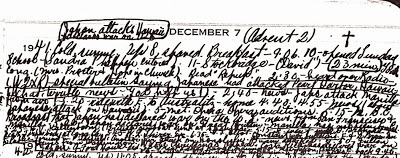
Oh, my, god. Here I'm about to make what may be my most important contribution to the recorded history of the World War II era and it begins with an accident. Not the kind of accident where a car bumps into a tree, or a bomb prematurely falls out of a plane, but rather...well...an accident. I'm not sure how else to put it.
On Saturday, Nov. 9, I spoke at the Stockbridge, Mass., Library about Lieutenant Edward L. Forrest. The talk involved a bit of Berkshires history, and I knew that of the 30 or so people in the audience, almost every one of them knew more about Stockbridge's history than I. I thought of a time I attended a meeting of NYMAS -- the New York Military Affairs Symposium -- one of the savviest bunch of amateur military history buffs on the planet. The speaker that evening was a college professor who was enamored of the story of Breaker Morant, read two or three books about him, and wanted to give a talk. The audience knew so much more about Breaker Morant than the poor speaker that when it came time for comments and questions, it was like watching one of those crocodile eats wildebeest videos on YouTube.
Part of my talk involved a visit to the late Dorothy Cooney, who had been Ed Forrest's girlfriend. I photocopied the diary of the Rev. Edmund Randolph Laine, who raised Ed from the time he was 14. I would read passages from the journal to Dorothy and she would tell me who the people were. For instance, on April 7, 1945 (four days after Ed's death, but the minister had not yet received the telegram), Laine was writing an airmail letter to Ed when he was interrupted by a phone call from New York from Gertrude Robinson Smith telling him her mother died. Dorothy asked if I knew who Gertrude Robinson Smith was. I shrugged. She then said one word.
I later googled Gertrude Robinson Smith, so my extent of her contribution to Berkshires history was limited to that one word from Dorothy and a Wikipedia entry, and the prospect of being wrong and having 30 people correct me was terrifying. So when I said Dorothy responded with one word, I asked if anyone knew what that word was.
Whew! Not only would I have been correct, but the entire audience, almost in unison, responded "Tanglewood." (Gertrude Robinson Smith raised much of the money to buy the property and build the shed at Tanglewood.)
But back to the accident. Reverend Laine's handwriting was not easy to read, and he often abbreviated words to save space (E. for Ed, Cong. for Congregation, Ch. for Christian, things like that). More than a decade ago I began transcribing the entries, but I set the project aside to work on other things.
There was a great deal of interest among the audience in the diary. So when I got home I opened the folder on my computer which holds the diary transcriptions and saw I'd transcribed some whole months -- like the month Ed was killed -- and some partial months.
I decided to post some diary entries, starting with the day Pearl Harbor was attacked. My spirits lifted when I looked at the folder and saw a file for December of 1941. But when I opened the file and scrolled down, the last entry I transcribed was December 6. What's up with that?
This is what's up with that:
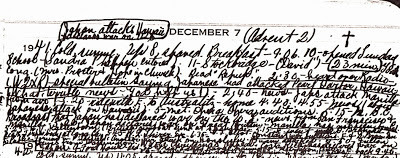
Holy Cow! No wonder I didn't try to transcribe it. Nevertheless I'll now do my best to transcribe and translate the entries for the first week of December. And then I read about the accident.
Reverend Laine was a chaplain in World War I, and he was gassed. By now he was middle-aged, portly, and likely still suffered some of the physical aftereffects of the war. Thus the entry for December 1, 1941, begins with a dose of sal hepatica. If you don't know what sal hepatica was, this YouTube video might be helpful.

Here is my best effort at transcribing the diary entries. If you recognize any of the names or wish to suggest corrections, please either do so in the comments or email me at aelson.chichipress@att.net.
December 1941
December 1: (Monday) Cold, sunny. Up 11:30, shaved. Took sal hepatica. Breakfast B12:35. Miss Canning phoned. Had accident before I could reach bathroom. Took shower bath. Paid bills. 2:10 Bto Bank B saw Mr. Taylor of St. Edmund=s on way. Read ATimes.@ 5 Btook wine jelly to Miss Minnie Ball in South Lee (did not see her) B 4:30 to tea with Mrs. Hiss (Tracy=s) Bher daughter, Mrs. Thomas, there Bback 5:35. Grown very cold. 6 Bnews. 6:20 B Miss Sparks phoned about Libbie Hofmayer case.* C.S. Heyward phoned. W.L. MacClintoc phoned (spoke to him about haymaking trucks parking here at night). Phoned Mrs. Sparks that I was sending Hofmayer file to her. E. took Miss F. To E. Millers (S. Lee) & left files (unintelligible) Mrs. Martin. Mrs. Thomas phoned & came to see me about Hofmayer.10 - R.G. Swing.
December 2: (Tuesday) Very warm, rainy a.m. then foggy. Up 11, shaved. (Radio BAPepper Young=s Family@ & news). 12:10 B Miss Sparks called, did not see her. Had creamed corned beef for breakfast. Mrs. Thomas phoned. Read ATimes.@ Worked on Library book list B to Library with it. Read AEagle.@4 B To Peters, Lenox, to look for Christmas gifts B back 5:20. Mr. Lahart (electrician) of Lenox phoned. 6 BNews. Eve. B raining. Radio music. 7:15 B AMrs. Keen.@Read in 2 of Bp. Davies=books B ADiverson of Staying at Rome" and "After Confirmation, What?" 8:40 BE. came in study & read. 9 BQuincy Howe. 9:30 B AFibber McGee.@10 B R.G. Swing BRead in AChrist. Cent.@ Had sandwiches & apple. Read in Reader=s Digest.
Dec. 3: (Wednesday) Very mild, sun out at 1:50. Up 11:25, shaved. 12:45 BF. Pilling came & put new cap on shower bath. Read ATimes.@ Read in AChristian Century.@ Changed clothes. 3 - to Woman Auxiliary meeting (Mrs. Eastman spoke) B I made a short talk. 3:45 B met Richard Sporrell(?) At end of driveway B long talk with him about truck & police situation. Very mild. Read for Sunday=s sermon. 6 BNews. 7:15 B Arthur Hale. Very heavy fog. E. to movies. Read about years before World War in ARoad to War.@* 8 B Quincy Howe. Read in AFall of Russian Monarchy.@ 10 BRaymond Gram Swing. Had bran muffin, apricots & milk. 8:30 B Kaye Brinker. 10:45 B News. Read in AFall of Russian Monarchy.@Shower bath.
*Interesting that he should be reading this four days before Pearl Harbor. Here's an article by the author of "The Road to War" published in the Harvard Crimson in January of 1941.
Dec. 4: (Thursday) Very warm, sunny. Up 11:30, shaved. Mrs. Sedgwick phoned. 1:30 BMr. Lahart (electrician) of Lenox came to see about putting new light in sacristy. To Church with him. Mrs. E. Miller in. Mrs. Davidson in for press notices. Read ATimes.@ 3 Bwalked to call on Miss Canning (out) Bhome B read AEagle@B then walked to Dr. Campbell=s (new house). Cold [sinus?] B (talk about Glen Pilling, etc.) B to Library Bhome 5:15. 6 B News. Eve. B Ans. Letters of Prof. Williams of Mt. Holyoke referred to me by Bp. Lawrence. Read in Quinn=s AEdgar Allen Poe.@[illegible] 10 B R.G. Swing. Wrote [illegilble] to a Miss Lillefield in Springfield (about a Mr. Fallon).Very heavy fog. Had sandwiches.
Dec. 5: (Friday) Very warm (records broken), sunny till 1. Up 11:35, shaved. Noon BRadio News. Read ATimes.@ To Church to see new light installed in Sacristy B talk with Mrs. Derrick & Miss Canning Bback 3:35. 4 B Library Trustees meeting B over 5:20. Raining but hot. Read AEagle.@ 6 BNews. Eve. B Mrs. Dunn phoned B just home. 7:15 B Arthur Hale. E. To card party at Cong. Church. Changed clothes. No one came at 8:30 to Parish House as Mrs. Sedgwick had planned. 9 Bturned out P.H. lights. 9 BQuincy Howe. Read in Millis=ARoad to War.@Had milk & bran muffin.
Dec. 6: (Saturday) A trifle cooler, sunny. Up 10:45. Army unit passed thru this a.m. Read in ALiv. Ch.@ & ATimes.@ Began to listen to ADie Walkure@from Met. Opera. E. Took nap. Rec=d minutes of Christ. Education Dep=t. 3:35 B walked around grounds B growing much colder B great change in weather B to Library. Read AEagle.@ 4:40 - 5:30 Bdozed in chair in study. Looked over some old W. Mass. Journals. 6 B News. Eve. Bpicked out hymns. Wrote note of sympathy to Mr. Stewart Forbes & a note to Miss Maude Young. 7:45 BH.V. Kaltenborn. Read in AQuiet Flows the Don.@ E. To Occ. Club. Had some gelatine salad. Shower bath. Grown very cold & windy.
Dec. 7: (Japan attacks Hawaii, declares war on U.S.) (Advent 2) Cold, sunny. Up 8, shaved. Breakfast - 9:06. 10 - opened Sunday School (Sandra P?) entered. 11 - Stockbridge - ("David") (23 min.) Good Cong. (Mrs. Procter & Hope in church). Read "Repub." 2:30 - heard over Radio (WQXR) special bulletin saying Japanese had attacked Pearl Harbor, Hawaii. (What terrible news - God help us!) 2:40 - news - Japs attack Manilla from air. 3:20 - rode with E. to Austerlitz - home 4:40. 4:55 - news (about Japanese attack on Hawaii). 5 - Met. Opera Opera auditions. 5:15 N.B.C. broadcast that Japan has declared war on the U.S. - news from San Francisco & Manilla. 5:20 - Japan declares war on Great Britain - Manilla has not been (?). ... Forbes body at Cong. Ch. 5:45 - W.L. Shirer. Eve. 6:35 - ... another war attack on Honolulu. ... (the rest of this entry is beyond my ability to transcribe! Although upon closer look, somewhere in there he notes: "Wrote Christmas appeal.")
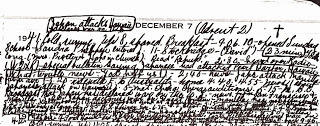
(More to come)
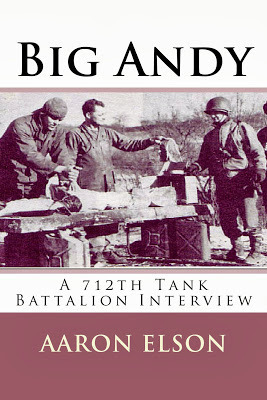 Now Available in print and for Kindle
Now Available in print and for Kindle
Published on November 10, 2013 17:52
November 2, 2013
An Okie from Muskogie
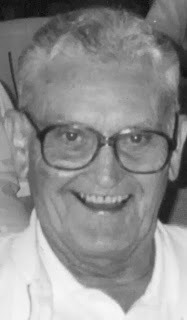 Doc Reiff
Doc ReiffI would often see Jack Reiff, one of two medical officers in the 712th Tank Battalion, at reunions. I recorded this impromptu interview in the hospitality room at the 1993 reunion in Orlando, Fla.
Jack Reiff: I was born July 24, 1918, in Muskogie, Oklahoma. A genuine Okie from Muskogie. And when I was about 11 or 12 years old I moved to Oklahoma City. My father was superintendent of schools in Muskogie, and then he was superintendent of schools in Oklahoma City, from about 1929 to 1940. I went to Oklahoma City High School Central, graduated first in my class of about 500, and then I went to the University of Oklahoma, Norman, and got a B.S. degree. I was first in my class when I got my B.S. degree. I graduated first in my class when I went to medical school, also, at the University of Oklahoma. I was in the ROTC when I was in college and med school, in horse-drawn artillery. My first contact with the Army was in horse-drawn artillery in 1934 and '35, and I could have been a second lieutenant in artillery with the ROTC. In medical school, our dean was Robert U. Patterson, who had been surgeon general in the United States Army for many years back before that, and he encouraged everybody to join the Reserves, so we did. Then just about that time, the war came along. But I did finish my internship at the University of Michigan, and then went back and did it at the medical field service school in Carlisle Barracks, Pa., where they had basic training in company administration, like OCS, for the medics. There were 1,300 in my class, so they started fanning them out to combat units, and I was sent to the 11th Armored Regiment in Fort Benning. The 10th Armored Division, the 11th Armored Regiment. The 11th Armored Regiment had been the 11th Cavalry, but they only had about 24 cavalry men as I can remember. A couple of them were medics. And one medical sergeant, one medical technician, and three or four officers, and then about twenty other enlisted men were spread out through the whole regiment. We spent our whole time training the medics and giving physical exams, physical inspections, and immunizations, which was a horrendous thing. We had 3,000 recruits, and I was in charge of the thing. Every one had to have three typhoid shots, three tetanus shots, and they had to be at specified intervals. If you didn't make it between the five and seven days, they had to start over. And the tetanus was three weeks, so there wasn't any way to coordinate it. And the smallpox had to be read in ten days. So seven days, ten days and two weeks, and then, of course, you've got all kind of things, you just had to go individually, this guy needs so-and-so, so then you get a big long list and send it to the first sergeant of the company, and he would be on KP or on guard or on furlough. It was just real hard to get them all there. I mean, it was a nightmare. And then I was with the 712th from the very time it started, when they decreased the size of the armored division. They didn't have armored regiments anymore, just separate battalions, so I went with the 712th when it split off. They split off another battalion at the same time, and that battalion went to school troops at Fort Knox. We were in a very small ship in a big convoy, the USS Exchequer, just our battalion plus just a few other people. I don't think it carried a thousand people. It was a banana boat that had been used just in South America up here into Florida or someplace, and had never been out on the ocean. Then we were crowded. Most of the men were down in the hold. The officers had nine guys in a room that was just the size of, one cot, and one cot, and one cot, three high, no place to put your stuff but in bed with you. And, oh, sick, sick, sick. I'm scared. I did a lot of physical inspections then, too, to be sure they didn't have the measles. That was another thing, when we first had all of those recruits, they had a lot of epidemics, because throwing all these guys together, they had measles, chicken pox and all that kind of stuff, especially measles was very bad. That's about the only time I ever worked in the Army hospital at Fort Benning was during a measles epidemic. I was what they later called a combat medic. They didn't call them medics at that time, it was a medical detachment. And we just went with the tanks. We crossed the English Channel in LSTs. Getting on them was a funny thing. These two tank battalions, we got the message to go to Southampton on the 6th of June. We had practiced, we had dry runs, but this was sort of a surprise, and when we got down there they held us several days. And that was a scary time. We didn't know what was going on. So then we went on LSTs, and we were on the ship several days. And then, very tough slogging, hard going, heavy casualties and everything until about the 24th of July, that was when they had that 1,000-bomber raid.
You said there were a lot of people scared. How did that manifest itself? Oh, I don't know. I think that anybody that said they weren't scared were the ones that got combat fatigue. We just didn't know what was going on at all.
When you got inland a little bit, what did you do? Usually, well, you've talked to [Forrest] Dixon a lot. The funny thing is the Army had us medics set up, we had 20-year-old halftracks, like a mortar halftrack, pulling great big trailers like the tankers use for ammunition. That was really unhandy for us. I mean, those doors on a halftrack aren't very wide, and if you tried to put somebody in a litter, you'd bust your knuckles, and you had to push them up above your head to one side. It was very difficult to use it. And I actually lost a jeep in the drink coming in on the beach, so we got a three-quarter ton jeep, a weapons carrier, it looked like a jeep but it was a weapons carrier. So we used that for our supplies, and it had seats along the side. We put the litters and long stuff along the side, supplies and blankets and all that in there. And the medical sergeant, Sergeant Lingeman, built a cabinet that had space for everything. We didn't go in buildings, we were living in foxholes.
What do you remember about the first day, the first casualties that came in? Actually, the first casualties that I saw were Germans. They kept bringing them in. That was a little scary, too. There was one German lieutenant that we talked to, they carried their service records with them, where we had our service records in the company, so he had the picture, and the ID, and this guy's got a monocle, and he just looked like a typical version of a German lieutenant. He had the monocle in his picture in his service book, of course he didn't have it on him. Our tank battalion was fragmented a lot. This company went out with this unit, and this company went with that unit. So our battalion headquarters, our battalion command and so forth and service company, we really had a problem going out and finding out and giving immunizations and so forth. We took care of the casualties that were close, whatever medics were close to our people. I took care of a lot of paratroopers and British soldiers and infantrymen, and people from other units, because our battalion really didn't function like a battalion, like they did in Africa, where the whole battalion was fighting as a battalion. We had this company out with this regiment, and this platoon with this company, and they kept switching around, and our headquarters company didn't really command the whole battalion, they were more or less under the command of the infantry people that they were supporting. So it was kind of a situation, but then we always had people sick with colds...
Les O'Riley was saying that you and Doc Wojtowich had a wounded German, and Wojtowich accidentally snipped off a piece of his liver. Do you remember that? Yes, that was at the Falaise Gap. We had encircled the Germans, and had them in a pocket, and just mass destruction, so many casualties. So we had gone out picking everybody up, and the Germans had used paper bandages. We used gauze. I don't know if it was a medical thing, or just financial necessity. Anyway, this guy had a big wound, and of course, a wound of entrance is always smaller than a wound of exit, so the wound was in the front and he had a big bandage on. Yet the German medics had put a big bandage on the wound of entrance, but the wound of exit was much bigger, and the tails of the bandage and everything were back, sticking out the back, and messed up a little trying to cut off the bandages. He [O'Riley] called us the liver-snipper. Hepatectomy. Oh, what a deal. After that, see, there was so much death and destruction, dead horses and everything, we decided we were gonna have to have immunizations again. So all of our guys had to have tetanus and typhoid and all that. So there was always something going on.Do any cases, individuals stand out? Oh, yes. I remember very vividly, the hardest thing to take care of medically, the mortar, shell fragment wounds. Those mortar, shrapnel, just jagged, razor-sharp, all different shapes. And whether to take it out and run the chance of cutting someone on the way out. I don't know whether you've ever seen a piece of shrapnel, some of them just twisted, split, sharp knife edges. Well, anyway, I eased ... it was an American. ... Well, of course, Jim Flowers was our prize patient. I didn't work on him. I did go back to see him when he was in a field hospital. That was something else, keeping records was real tough. We started keeping a record of who was wounded and all that, it was quite a chore. Of course, the Army is so gung-ho on reports, that's how I got some of those notes. We always had sick, quite a few people that really were so sick they had to be evacuated, I mean like bleeding ulcer and all that kind of stuff that you had in civilian life. Stress.
What about frostbite? Yes, a lot of that. Trenchfoot and frostbite. And a lot of what we called combat fatigue, psychiatric casualties.
How did some of these manifest themselves? I don't know, it was just one of these, you know that you know. Gestalt. You know what gestalt means? There's several different things, but more than anything they were very agitated, so what they needed was just a little sleep, for a couple of weeks. Somebody said there was something called a Green 88? Sodium amitol. It was a barbiturate. We didn't have a tranquilizer. It was sleeping pills, it would just put them to sleep, just get 'em out of their misery for a while. In fact, I went to a school of military psychiatry, and that's what they recommended. We had quite a few cases of frostbite, but not as many as the infantry. But as I say, I did take care of a lot of infantry people. The system of a battalion aid station is to send people to the rear, the impetus, to evacuation. I'd go to my tanks and bring them back to me, then somebody comes to me and brings them back. The people that are supposed to come up, pick up from the battalion aid stations, are collecting companies. Medical collecting companies are primarily ambulance drivers, but they had the same problem with me that I had with my tank platoons. We were so far out in front of things, there wasn't a static line, we were moving, they didn't know where we were. So we got in the habit of taking the cases back to the rear echelons.
What were some of the other shrapnel cases? Oh, gosh, everywhere. Legs mostly, abdomen, you couldn't do much with that, we just evacuated those guys. As a matter of fact, do you know what definitive treatment means, in other words we didn't do any amputations or abdominal surgery or anything like that. We gave them plasma and put on bandages and stopped their bleeding, and stopped their pain, and get them back to the hospital.
Did you have many who died while you were treating them? Oh gosh, yes. A couple of the officers, one that I'd played cards with. Remember Cliff Merrill? He didn't die, did he? The way he tells it, it was hysterical, it was a big joke. Have you talked to him? He was so tough
It wasn't like that? I think that was combat fatigue in both of us!
You said that toward the end of the war, you thought you had combat fatigue? I don't know, I just got so shook up.
What was the name of the lieutenant who you played cards with? I can't remember, but boy, he had severe, very early, down in Normandy. He just, "You've got to give me a drink of water," or something. That's really hard on the medics, of course.
What were the signs that you can think of that would indicate you had combat fatigue? Who, me? I never did get turned in, it was nothing official. I was numb after awhile. See, I was in the whole thing all the way. A lot of medics got rotated. I got rotated, but not very much. This really wasn't a good idea, but along just about the time they got through with the Battle of the Bulge, somebody in the hierarchy decided that the guys that had been combat medics in the medical detachments should be given a break, they're doctors, too, they ought to be put in the hospitals, and guys in the hospitals should be put up at the front. Well, that's ridiculous. We spent our time knowing where the tanks were and knowing how to find tanks, knowing how to take care of ourselves, knowing how to dig foxholes. I wouldn't have done any good in a hospital, and they wouldn't do any good down there because they would have got killed the first time because they wouldn't know how to take care of themselves. So that was a dumb idea. But I got rotated to one of these collecting companies, which was just an ambulance company, just behind us. And this Hamilton guy (Colonel Ed Hamilton), I was transferred to his outfit. He was wounded way ahead of when I got there.
In your notes, you said there was one time when you came close to getting the Purple Heart. Oh, yeah. Several. Joe Diorio, I had one medic killed and another one wounded and a couple of patients were killed just after I had left an aid station, and then I also got a mortar shell in the back of the jeep. I wasn't in the jeep, I'd just jumped out of the jeep. And then down at the Falaise Gap, I got covered up by the dirt from a shell. Not hurt. I got my hand mashed, but that was just with a stick that got lodged in between the handle of the jeep and the body of the jeep, ground that little finger. That was very early. The medical colonel gave me a shot of morphine, I couldn't even feel it. That was in Tennessee maneuvers. I'm just now thinking about it. When I said colonel, it was Colonel Hansen, it was the 10th Armored Division, that was before we even left the 10th Armored Division. Okay, that's what made me remember that. And then in the hedgerows, well, I lost a jeep just coming into the beachhead, it just sunk and we got a replacement. And then a mortar shell just dropped in, I had a big radio, I don't know why the medics, they thought the medics had to have one of these big tank radios, you're riding along behind this hedgerow and the Germans would see that aerial, uh-oh, boom. But we got out.
You had mentioned seeing a German lieutenant come out of a tank when they surrendered... Oh, that was funny. It's a long story. Okay. Big story. We're on our way out across France someplace, and the people back as far as division headquarters and corps headquarters seemed to think that there was the front line, and this is friendly, and this is enemy territory. Our battalion was out here like those arrows sticking around, and way out in front, this infantry comes charging through our place after we've been there for a day. I had to go and report or something, and I went back to division headquarters, which was quite a ways back, and the division surgeon said, "Oh, you're with a tank battalion, yes? Where's your battalion?" And I had my map, I showed him, he said, "Come and show me on the big map." Then he says, "You can't be there. That's all enemy territory."
And I said, "Colonel, I've been in combat for X days, if I didn't know how to read a map I'd be dead."
So I said, "Let's go in to G-3," the big operations map. And sure enough it's just red, red, red, enemy territory.
So when I went back, I guess it was that night, during the night sometime, this tank comes just charging right down through battalion headquarters, medics and the maintenance. And Dixon got in that disabled tank and just fired point blank with a 105-millimeter or whatever it was, I think it was an assault gun, a 105-millimeter assault gun just point-blank into the tank, and just, of course, knocked it out.
The lieutenant came out, you know, he's this kid, he was just wounded in the arm, I mean, it wasn't real bad. So I got to talking to him in German, and saying "Germany's kaput."
"'No, nein, nein.'"
I said, "Well, you're kaput."
And he said, "What are you going to do with me?"
We're still speaking in German. I said, "I'm gonna send you to Amerikanische hospital." Okay, so then we got to arguing. I said, "Well, you're kaput."
And he says, "What's the matter?"
And I says, "It's your arm. You've got a compound fracture there."
He says, in perfect English, just like he was from Harvard or something, he says, "Which bone is it, Doctor, the radius or the ulna?"
I didn't have too much trouble. Up in Falaise, this major, German medical officer, he was gonna help take care of the casualties. He was a PW, we put him to work. He didn't want his men to have morphine sulfate, he wanted them to have morphine hydrochloride, a different kind of preparation than we used, and kept arguing. So I called for the MPs to come and get him, I can't put up with it.Describe the POWs that the battalion liberated Oh, good gosh. I think mostly Jewish. They were American soldiers, but I think they were mostly Jewish. I think the Germans had segregated them out. Maybe that was just a suspicion, I don't know whether that's founded or not. Oh, they were just absolutely skin and bones. Somebody came down from Stars & Stripes and took my picture, I think somebody has a picture somewhere.
What was it like at Flossenburg? Oh, that was a very calm thing. They just rolled in the front door, the tank, and that was the end of that. They just gave up.
What was your reaction to the inmates? Again, as I say, we didn't get too involved with trying to treat them. First they had to identify them.
How big a staff did you have? I think I had 25 enlisted men, and I usually had one more officer, Wojtowich. And for a while, there were three of us. Medical supply drivers, surgical technician and aid men.
Do you remember anything about Colonel Miller? I know the whole story. He was a West Pointer. He was a captain, and when the war broke out, he was suddenly promoted to lieutenant colonel. I told you that the 11th Armored Regiment had about 24 cadre men. He was one of them. Beverley Simms, who was a lieutenant. Colonel Morrow, I think his name was, a full bird colonel. Old man. Of course, we were 25 years old, 23. But he was a full colonel, probably 60 years old. Miller, lieutenant colonel, and a lieutenant. And I think that was about it, I think there were three or four officers, and 24 enlisted men. Well, because he was a West Pointer, he was made a battalion commander. And he was an obsessive, compulsive, extreme nit-picker personality. He did some real horrible things. I mean, like, here we are, as I say, everybody's scared to death, everybody's trying to do the best they can. When we got to England, we all had new equipment, all new uniforms, all new vehicles, and everybody in the battalion was a specialist. Medics, tanker, tank driver, gunner, radio operator, tank mechanic, whatever. And he decides we're gonna have a 25-mile hike. I mean, none of those guys should have to walk a step in combat unless they got captured or something. They're gonna have a 25-mile hike. And whoever drops out, why, his platoon sergeant has to carry his weapon and his platoon leader his pack or vice versa, and the medics have to carry him. And then they're gonna do it over again, some other time. Just unreasonable things like that. And having staff do something over on Sundays. Did you see "The Caine Mutiny"? Do you remember, Fred MacMurray was the bumbling exec officer? The captain, the skipper, was nutty with the balls, and then the second in command was just... well, we had one of those guys in our outfit, Major Davis. He was a very inept, kind of reminds you of Jimmy Carter, you know, with the smile and all that but doesn't know how to do anything. He just didn't. Major Davis just didn't know the war was on, I mean, really. But Colonel Miller bawls him out in front of all the troops. You know, if I had some GI, if I had some private that didn't do something, I'd say, "Hey, come here, how do you think I ought to handle this?" He says, "Well, captain, what do you think about 30 days KP?" And I'd say "Okay." What I'm trying to say is if I had a disciplinary problem, I didn't swear at him, I didn't do anything, I talked to him like he was a man. But Whitside just bawled poor old Davis out in front of the whole battalion, the officers, the men and everybody, embarrassed everybody.Was that when he made him doubletime? Oh, I don't know. The specific incidents, probably everybody can remember at least one. But I mean, it was just bad. Twenty-five mile hikes. Oh, he was going to reclassify, I don't know whether you know what that means, reclassify, somebody's a tank driver, he's got all this schooling and everything, we're gonna send him back to the States and make him a foot soldier, infantryman, reclassify him because he can't make a 25-mile hike. It was just one thing like that after another. He was just an obsessive, compulsive, neurotic, trying to do his best, and had that West Point background.
Did he actually reclassify anybody? I think by that time we got a little control of the situation and wouldn't let him do some of these dumb things. But he did make, on some of these hikes, if a guy couldn't make the march, the lieutenant had to carry his weapon and the sergeant's gonna carry his pack. And the medics are gonna carry him, and if you think that isn't fun to carry somebody for 25 miles. I mean... I stood up for him. I think I was the only one that did. I wrote a great long letter, and I told them that I thought it was unfortunate. [Col. Whitside Miller was relieved of his command before the 712th Tank Battalion left England, and was replaced by Lt. Col. George B. Randolph. Col. Randolph was killed during the Battle of the Bulge.]
- - -
 Now Available in print and for Kindle
Now Available in print and for Kindle
Published on November 02, 2013 13:53
October 25, 2013
A Crock of Hooey
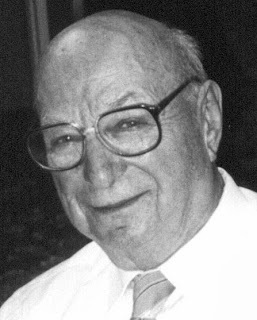 Ed Stuever
Ed StueverMore from the hospitality room at the 1993 Orlando, Fla., reunion of the 712th Tank Battalion:
Ed Stuever
At Fort Jackson, South Carolina, when we became the 712th Tank Battalion, we had to go for a physical before we went up north. And we stripped naked, walked up to the desk of this doctor, and as I approached him, he says, "How in the world did you ever get here?" And I says, "I walked here, Sir." And he says, "Don't get cute with me. You're not fit for this man's army. You've got the flattest feet I ever saw. Did you ever make a five-mile hike? Did you ever make a mile hike?" I says, "I made 'em all, even the 30-mile hikes, and I carried my buddy in the last couple of miles so that we could all get a pass to go to town." And he says, "Aww, you're not fit for this man's Army. We can use you in a hospital carrying bedpans." And I says, "Why, I'd be on my feet more than ever." He says, "Don't get so cute with me. I'm going to send you back with this report." And when I took it back to the office, I didn't even knock, I just walked in there and threw it on Sergeant Bennett's desk, and he says, "Get out of here and come back in here like you're supposed to." I says, "I don't give a damn what you do to me." And then the captain says to me, "What's this all about?" And I says, "Here's my medical report. The man there says I'm not fit for this man's army." So the captain says, "Why, you're one of our best soldiers." And I says, "This report is a crock of hooey," I says, "There's nothing here I can't do." He says, "You're up for sergeant. Didn't you put it up on the bulletin board, yet, Sergeant Bennett?" And he says, "I was just about to." And he says, "Steuver, what do you want to do? Do you want to carry bedpans or do you want to stay with us?"
And I says, "I sure as hell don't want to carry bedpans." So he tore up that medical report, and he says, "Congratulations. You're gonna stay with us." And then he dropped it in the wastebasket. And then when I was ready to leave, I apologized for the way I came in and I saluted him. Then I reached down and I picked up that report out of the wastebasket, and Bennett says, "What do you want to do with that?" And I says, "I want to remember that S.O.B.'s name so if I ever see him again, I'm gonna avoid him, or I'll run over him with my tank." That's the end of it. Oh, when we got to England, I didn't care to make some of them overnight affairs that we had, so I'd say to Sergeant Bennett, "Boy, my feet are killing me." And he says, "You son of a gun, you still got that report? I'm gonna shake you down till I find that thing." So he says, "You stay in the office here and run the office overnight." So I had to stay on duty all night. I didn't get away with it.
- - -
Now available in print and as a Kindle ebook (click on the cover):

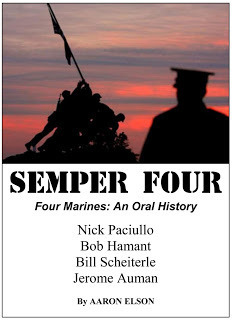
Published on October 25, 2013 10:12
October 21, 2013
More from the Hospitality Room
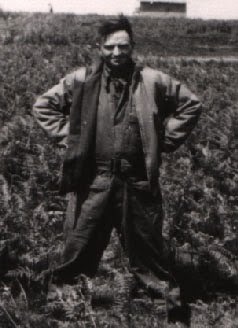 Bill Doyle
Bill DoyleIn 1993 I returned from the Orlando reunion of the 712th Tank Battalion with a dozen tapes of interviews. Some of the material was used in my first book, "Tanks for the Memories," which I self-published in 1994.
Most of the interviews were recorded in the hospitality room.
Bill Doyle was a member of D Company, which had 17 1/2 ton light tanks.
Bill Doyle
I'm 75. My fiftieth anniversary is coming up in February. Our job in D Company was to just go out there and find out where in the hell they were, to sneak up, then get the hell out and let the big guys go after them, because our little tanks, they only had little 37-millimeters, and they bounced off of them Tigers like it was kids shooting marbles, you know, you'd hit one marble and the other one would bounce, it's gone. You'd do no damage. Paul Wanamacher over there, he was in an area that was overrun with Germans [Mairy ... see "Destruction of the 106th Panzer Brigade]. We were all around the same neighborhood. They could see us shooting at the Germans. I guess we were where we weren't supposed to be. Some broke through the lines, and you could see our 37-millimeters didn't mean nothin', it was just like swatting a fly. None of them (the light tanks) got lost. It was just, there was an observation point up there and he called for artillery in the same place, so that helped us out a hell of a lot. That gentleman coming around the corner there [one of Col. Vladimir Kedrovsky's sons ... Kedrovsky was the battalion's third and final commanding officer], his father, you couldn't meet a finer man. He never asked you to do anything that he wouldn't do himself, that's the kind of guy he was. I don't know if I can put it in much better words. He was never too busy that you couldn't talk to him.
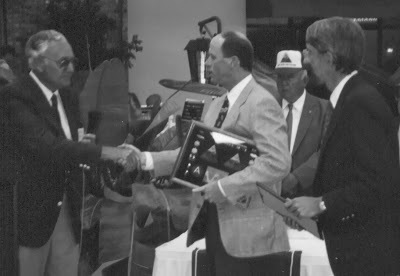 Carl and Tim Kay, sons of Col. Vlad Kay (formerly Vladimir Kedrovsky) at the 1993 reunion. We were reconaissance. We'd just go out, get a mission, if it was too rough, we'd just back up, get out of the way and let the big guys take care of them. He either shoots at you or you see them first and you run. But before you run, before you do anything else, you're always on the radio talking to whoever's behind you. After that deal there (at Dillingen), a bunch of us got the Bronze Star. Every time the kids would say something to me about it, "Oh, I hit a lieutenant." I said, "I punched a lieutenant in the mouth and got away with it." I never spoke to them about it or told them what happened, until they cornered me. Then I had to tell them about the river crossing, going up and getting the guys [wounded] and bringing them back. But to name names, the names are forgotten.
Carl and Tim Kay, sons of Col. Vlad Kay (formerly Vladimir Kedrovsky) at the 1993 reunion. We were reconaissance. We'd just go out, get a mission, if it was too rough, we'd just back up, get out of the way and let the big guys take care of them. He either shoots at you or you see them first and you run. But before you run, before you do anything else, you're always on the radio talking to whoever's behind you. After that deal there (at Dillingen), a bunch of us got the Bronze Star. Every time the kids would say something to me about it, "Oh, I hit a lieutenant." I said, "I punched a lieutenant in the mouth and got away with it." I never spoke to them about it or told them what happened, until they cornered me. Then I had to tell them about the river crossing, going up and getting the guys [wounded] and bringing them back. But to name names, the names are forgotten.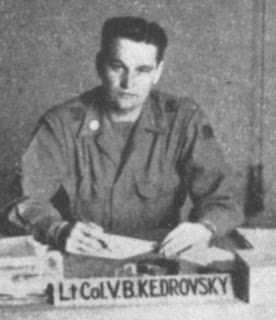
Published on October 21, 2013 16:27
October 6, 2013
A Thimbleful of Moldy Sugar
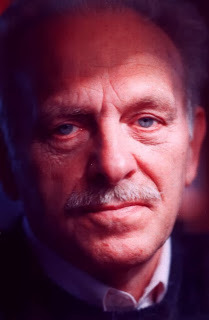 Lou Putnoky
Lou PutnokyLou Putnoky called me on Saturday afternoon. Since his wife passed away a few years ago Lou tends to call every three weeks or so, usually on a Sunday or on Memorial or Veterans Day. He always asks me if it's a bad time to call, and I always tell him it's never a bad time to call. Those of you who've read my book "A Mile in Their Shoes" should be familiar with Lou, a World War II veteran of the Coast Guard who was a radio operator on the USS Bayfield, the flagship of the Utah Beach invasion fleet. It was rare for him to call on a Saturday, but Lou suffers from post traumatic stress disorder and perhaps depression as well. He wanted to tell me his birthday is going to be in a few days, I forget how many days he said, but he's going to be 90. I told him to hold on while I placed an order for several shares of stock in a candle company. Then he asked me if he'd ever told me the story about Andy Baumgartner.
I told him he hadn't. Before he enlisted in the Coast Guard, Lou said, he took part in some kind of a four-year program in which he trained during the summer, and if you succeeded in the program, at the end you would receive a commission. The program was cancelled in 1940 after Lou had spent two summers in it.
He said there were two units that took part in the training, one was the 18th Infantry and I forget what the other one was. And he said Andy Baumgartner, who ran a hardware store in Carteret, where Lou grew up, was in the 18th Infantry on Corregidor when it fell and that Andy took part in the Bataan death march He said Andy lived across the street from a very good friend of his, so he would see Andy from time to time, although Andy was a little bit older and they were never that close. But one day Lou called Eli Holtzman, a writer for a local paper with whom he was friendly, and asked if Eli would be interested in doing a story about Andy. Andy had suffered a stroke, and was not in good condition. He sat hunched over in his chair and could barely make himself understood when he spoke, and his daughter Nancy helped out and filled in a lot of his story. Andy was a cook while he was a prisoner, preparing what little food there was for his fellow prisoners. When they captured Corregidor, the Japanese confiscated a supply of Carnation evaporated milk. Andy would carefully remove the paper labels from the cans, and he used the blank inside part of the labels as a diary. Lou noticed that there were several names in the diary with diagonal lines drawn through them. He asked what they meant. I don't know if Andy told the story or his daughter told it for him, but Andy had discovered a bag of moldy sugar, and he hid it from the Japanese. He also had a thimble from a sewing kit. He would fill the thimble with moldy sugar, and one at a time he would take it to his fellow prisoners. He would tell them to hold out their hand, and he would empty the thimble full of moldy sugar into it. They would ask him what it was, and when he told them, they would hurriedly raise their opened hand to their mouth and gulp down the thimbleful of sugar. Then Andy would put a little chit by their name. What was the chit for, Lou asked. He said Andy struggled to get the words out, but he said that he told the prisoners that if they ever got out alive, they would owe him a dollar for each thimble full of moldy sugar. Lou said he could see a tear rolling down Andy's cheek. And then he kind of smiled, and said that after the war, at a reunion of the survivors of the Bataan death march, one of the other former prisoners came up to him and gave him two dollars. Happy birthday, Lou Putnoky!
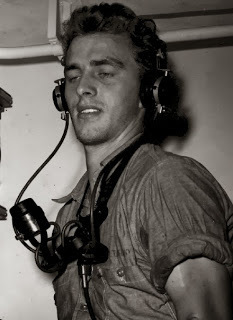 Lou Putnoky aboard the USS Bayfield- - -
Lou Putnoky aboard the USS Bayfield- - -
Published on October 06, 2013 19:43
October 5, 2013
"Russky gonna cut you throat"
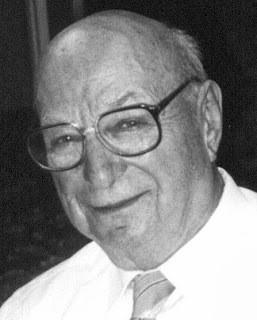 Ed Stuever
Ed Stuever More from the Hospitality Room. I first recorded Ed Stuever, a sergeant in Service Company of the 712th Tank Battalion, at the battalion's "mini-reunion" in Bradenton, Florida, in January of 1993. Dick Greca, also a member of Service Company, was seated at a table, as were a couple of other veterans.
Ed "Smoky" Stuever In Normandy, they liberated a young Russian. He was about 21 years old, and the Germans had him digging foxholes. So when he heard the Americans were coming he hid out, and he waited till we came along. Then they told me to take him with me, he's a good worker. I had him with me doing hard work, moving the tracks around. We had him from Normandy until August, when we were in Briey, France. He was walking down the main street over that little bridge, and he saluted a colonel of the MPs in a jeep with a cigarette in his hand, and they hauled him away. We never saw him again. In all this period, he would always approach me and he'd say "Sergeant, what you do when Russia and America come together?" I said, "I go home. I can go home tomorrow, I have enough points." "'No, no. You no go home. Russky gonna cut you throat." Time and time again he would approach me with this, "Smoky, what you do when America and Russia come together?" I couldn't sleep with that guy around. I had a real sharp dagger, and I had an extra pair of boots on the truck. They were all worn and I wanted to exchange them whenever I got a chance. And he said, "No, I want them." I said, "No, you can't have them." He said, "Let me have your knife." This was still in Normandy. And next day he comes back with a shiny pair of Nazi boots on, and he gave me my bloody knife back. So I could never sleep with him around.
Dick Greca In Service Company, we'd go fishing with hand grenades. Throw 'em in the river, fish would come up, and we'd pick 'em up. Big German trout, brown trout. Hey, you know, I was on a little rowboat and I dropped one off the side of it. That's the last time I did that, because that water wasn't too deep, and you could feel the concussion. One night we went up to check the tanks, and the crew heard us talking. They got scared and thought it was the Germans out there, and they threw a hand grenade out. Two of us got hit, but not serious. We all walked away. I jumped under the tank, so I wouldn't get the shrapnel, and the doggone tank started to move. I said, "Now what?" I got out of there real quick. Jim Cary [Capt. Jim Cary was the C Company commander] remembered me going up on the first day of combat. His tank was acting up, and I came up and took care of it. I can remember that real well. I can remember after he got hit, what do you call them things, booby trap, his raincoat was all shredded. And he was always one to preach, "Watch out for booby traps." The guys got a kind of a kick out of it, not that they laughed at him, because he was so strict. I seen a guy come out of a barn, and he had one of these things in his hand, one of those potato mashers, but he was all slaughtered up. But he was still walking, and the handle was still in his hand. He came out and I'll never forget. He wasn't with our outfit. We just passed him. He probably went to look for a dozen eggs someplace.
Jim Flowers If I had it all to do over again, I'd probably do it the same way. Even knowing what I know right now.
Dick Greca Like I always say, I wouldn't do it for a million, what I done before, I wouldn't do it again for a million either. We done our goofing off. We always had some cognac or Calvados, or something around. I think that probably got us through better. You know what I mean.
- - -
Published on October 05, 2013 14:54



